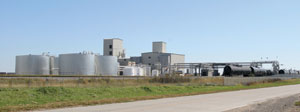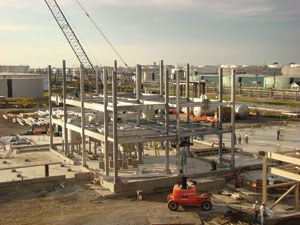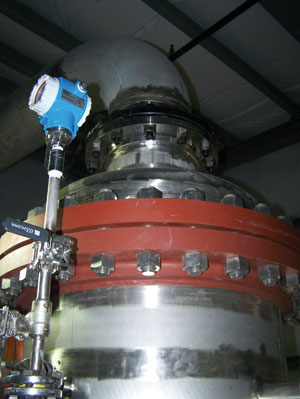Alternative Energy, Standardized Processes




January 15, 2009
BY Alicia Clancy
Biodiesel as an alternative energy source is not a new concept. In fact, Rudolf Diesel, inventor of the diesel engine, explored the use of vegetable oils as engine fuel more than 100 years ago. Today, thanks to high energy prices, the need to reduce dependence on foreign oil and heightened concern regarding the environmental impact of fossil fuels, biodiesel is a viable, cleaner alternative to traditional diesel fuel.
In the heart of the mid-American grain belt, one company is doing its part to make biodiesel more readily accessible to consumers. In 1996, West Central Co-op built its first biodiesel plant in Ralston, Iowa. The co-op was interested in bringing a new product to market using the oil byproduct of meal, one of its existing soybean products. The offering tapped into a new market of alternative fuel for mobile diesel engines, mostly for farming, industrial and fleet industries.
Due to the high demand for its biodiesel product, West Central Co-op began marketing premium biodiesel fuel in 1998. By 2002, the co-op operated a 12 MMgy production facility in Ralston-one of the world's most sophisticated continuous flow processing plants for turning soybean oil into premium biodiesel fuel. Now known as Renewable Energy Group Inc., the company's network has seven operational biodiesel plants that each produce 30 MMgy to 60 MMgy of biodiesel. In addition, the company will own or operate three more plants that are either under construction or in preconstruction stages. Today, their production capacity is more than 300 MMgy.
The Challenge
In 2002, when the co-op was operating as a single, multi-product plant in Ralston, REG automated most of its biodiesel-making process using a programmable controller. Pulling real-time data from a programmable controller and human-machine interface, the co-op used a basic reporting system that allowed the press plant to buy beans from the elevator in real time, while calculating the yield of oil meal-to-bushels used. However, the plant was producing biodiesel one batch at a time, which resulted in down time that required operators to wait for tanks to be emptied before continuing production. In addition, some steps of the process were performed manually, such as adding bags of catalyst chemicals to initiate the biodiesel-making process or moving hand valves to route each batch to the next tank during production.
Though it was feasible to process oil into biodiesel using this simpler automated batch system at the original Ralston facility, REG knew that as it expanded, additional automation would be necessary to keep costs reasonable and to produce biodiesel at an efficient rate. To meet this need, the company wanted to standardize on a process control system across its existing and future biodiesel plants. This standard system also would help simplify troubleshooting, maintenance and training, regardless of plant location.
The Solutions
REG turned to its trusted systems integrator, Interstates Control Systems, a Rockwell Automation solution provider, for assistance in choosing a control platform and equipment for its existing biodiesel plant that would also serve as the standard for future production sites.
REG needed to increase operational efficiency, monitor the quality of glycerin from the biodiesel production process, and make sure the biodiesel it produced exceeded current industry standards. ASTM International standard D 6751 specifies use guidelines for blending biodiesel with petroleum diesel, as well as the maximum allowable levels of impurities in the finished biodiesel product. In addition, regardless of where the crude oil originated, the biodiesel needed to be of the same quality and consistency. To help meet these goals, it sought an automated process control platform to produce biodiesel with system monitoring.
Confident in Interstates Control Systems' 10-year successful relationship and familiarity with Rockwell Automation, REG installed two Allen-Bradley ControlLogix programmable automation controllers, based on the Rockwell Automation Integrated Architecture, to run each plant. Unlike REG's previous controller, the ControlLogix programmable automation controller is multidisciplined, meaning that it can manage discrete, batch, process, motion, safety and drive capabilities on a single platform. One controller runs the pretreatment section of the plant, where crude feedstock oil is cleaned and impurities are removed. The other controller runs the processing plant, where the clean oil is converted into biodiesel.
The Rockwell Automation relationship with process instrumentation provider Endress+Hauser made the solution even more effective and easier to implement. With preferred integration between Endress+Hauser process instruments and the Rockwell Automation Integrated Architecture, REG can help protect its investment with assured interoperability.
The relationship provides a wide range of preintegrated, pretested, standards-based measurement, automation and information solutions.
Since Endress+Hauser equipment is designed for easy integration with Rockwell Automation parts and systems, it was an easy decision to use Endress+Hauser flow, level and pressure gauges. In addition, Endress+Hauser products stand up to the demands of the biofuel process. For example, the company's glass pH probes have a chemical resistance and can withstand high temperatures and pH extremes, while its ion-selective field effect transistor probes can withstand high alcohol content and non-aqueous applications.
Custom-enclosed Allen-Bradley PowerFlex AC drives connected to the ControlLogix controllers via DeviceNet help manage flow rates throughout the refining process, helping to maintain the proper tank levels during each step of the process.
The controller is also connected to an intrinsically safe Allen-Bradley FlexEx input/output module via ControlNet, allowing biodiesel processing data to be collected from inside hazardous areas of the process plant and monitored remotely. The FlexEx module provides a single connection from the ControlLogix controller to the nonhazardous area, helping to reduce wiring and electrical labor and lower safety risks in an environment where highly flammable catalyst and reactor chemicals are used.
The data collected from the FlexEx input/output module, ControlLogix input/output modules and PowerFlex drives during the biodiesel production process includes metrics on flow, temperature, pressure, pH levels and tank levels throughout the plant. If any of the elements are outside of the allowable ranges, the quality of the biodiesel is adversely affected and may not pass the 14 to 15 tests that check characteristics such as moisture level, total acid number, sediment and flash point. For example, if the temperature in the tank where crude oil is mixed with the alcohol and catalyst to start the biodiesel process is too high or low, the mixture results in too much glycerin and reduced biodiesel output.
Human-machine interface terminals running FactoryTalk View SE human-machine interface software help operators respond remotely to fault trips and system alarms. If an element in the production process is out of its permissible parameters and cannot be automatically adjusted, operations in that specific step of the process will cease until a plant operator can make manual adjustments. The automatic system shutdown confirms that below-optimum biodiesel is not produced.
Quality Results
By establishing a standard control system that acts as a model template for all of its existing and upcoming biodiesel plants, REG has reduced its design, installation and training costs. In addition, start-up and troubleshooting time has been reduced, allowing the company to get biodiesel to market faster.
Preintegrated Endress+
Hauser field instrumentation allowed for a reduction in integration costs, and improved operational and maintenance efficiency, helping to optimize REG assets.
Perhaps most significant are the savings in labor costs. The automated control systems in place at the smaller, existing plants process as much biodiesel in one day as it would take 30 workers to do during multiple shifts using batch production.
Training for plant operators also has been simplified, thanks to the identical plant designs. A portable training module using FactoryTalk View SE human-machine interface software (with an all-simulation model connected to a ControlLogix controller) allows training to take place in any office. Using the training module, operators can experience exactly what disturbances would look like in any plant and learn to react effectively.
According to Myron Danzer, REG's vice president of customer and technical service, the experience REG has had with the process solution from Rockwell Automation has been more than satisfactory, especially as more plants are built. The plant managers at REG have increased operational efficiency, more easily monitored product quality, and are meeting current industry standards.
"Rockwell Automation has exactly what we need so we don't have to look for exotic, custom-designed equipment," Danzer says. "The support that's behind it is always there and we have local distributors that can help wherever we go."
Alicia Clancy is a communications specialist for REG Inc. Reach her at alicia.clancy@regfuel.com or (515) 239-8118.
In the heart of the mid-American grain belt, one company is doing its part to make biodiesel more readily accessible to consumers. In 1996, West Central Co-op built its first biodiesel plant in Ralston, Iowa. The co-op was interested in bringing a new product to market using the oil byproduct of meal, one of its existing soybean products. The offering tapped into a new market of alternative fuel for mobile diesel engines, mostly for farming, industrial and fleet industries.
Due to the high demand for its biodiesel product, West Central Co-op began marketing premium biodiesel fuel in 1998. By 2002, the co-op operated a 12 MMgy production facility in Ralston-one of the world's most sophisticated continuous flow processing plants for turning soybean oil into premium biodiesel fuel. Now known as Renewable Energy Group Inc., the company's network has seven operational biodiesel plants that each produce 30 MMgy to 60 MMgy of biodiesel. In addition, the company will own or operate three more plants that are either under construction or in preconstruction stages. Today, their production capacity is more than 300 MMgy.
The Challenge
In 2002, when the co-op was operating as a single, multi-product plant in Ralston, REG automated most of its biodiesel-making process using a programmable controller. Pulling real-time data from a programmable controller and human-machine interface, the co-op used a basic reporting system that allowed the press plant to buy beans from the elevator in real time, while calculating the yield of oil meal-to-bushels used. However, the plant was producing biodiesel one batch at a time, which resulted in down time that required operators to wait for tanks to be emptied before continuing production. In addition, some steps of the process were performed manually, such as adding bags of catalyst chemicals to initiate the biodiesel-making process or moving hand valves to route each batch to the next tank during production.
Though it was feasible to process oil into biodiesel using this simpler automated batch system at the original Ralston facility, REG knew that as it expanded, additional automation would be necessary to keep costs reasonable and to produce biodiesel at an efficient rate. To meet this need, the company wanted to standardize on a process control system across its existing and future biodiesel plants. This standard system also would help simplify troubleshooting, maintenance and training, regardless of plant location.
The Solutions
REG turned to its trusted systems integrator, Interstates Control Systems, a Rockwell Automation solution provider, for assistance in choosing a control platform and equipment for its existing biodiesel plant that would also serve as the standard for future production sites.
REG needed to increase operational efficiency, monitor the quality of glycerin from the biodiesel production process, and make sure the biodiesel it produced exceeded current industry standards. ASTM International standard D 6751 specifies use guidelines for blending biodiesel with petroleum diesel, as well as the maximum allowable levels of impurities in the finished biodiesel product. In addition, regardless of where the crude oil originated, the biodiesel needed to be of the same quality and consistency. To help meet these goals, it sought an automated process control platform to produce biodiesel with system monitoring.
Confident in Interstates Control Systems' 10-year successful relationship and familiarity with Rockwell Automation, REG installed two Allen-Bradley ControlLogix programmable automation controllers, based on the Rockwell Automation Integrated Architecture, to run each plant. Unlike REG's previous controller, the ControlLogix programmable automation controller is multidisciplined, meaning that it can manage discrete, batch, process, motion, safety and drive capabilities on a single platform. One controller runs the pretreatment section of the plant, where crude feedstock oil is cleaned and impurities are removed. The other controller runs the processing plant, where the clean oil is converted into biodiesel.
The Rockwell Automation relationship with process instrumentation provider Endress+Hauser made the solution even more effective and easier to implement. With preferred integration between Endress+Hauser process instruments and the Rockwell Automation Integrated Architecture, REG can help protect its investment with assured interoperability.
The relationship provides a wide range of preintegrated, pretested, standards-based measurement, automation and information solutions.
Since Endress+Hauser equipment is designed for easy integration with Rockwell Automation parts and systems, it was an easy decision to use Endress+Hauser flow, level and pressure gauges. In addition, Endress+Hauser products stand up to the demands of the biofuel process. For example, the company's glass pH probes have a chemical resistance and can withstand high temperatures and pH extremes, while its ion-selective field effect transistor probes can withstand high alcohol content and non-aqueous applications.
Custom-enclosed Allen-Bradley PowerFlex AC drives connected to the ControlLogix controllers via DeviceNet help manage flow rates throughout the refining process, helping to maintain the proper tank levels during each step of the process.
The controller is also connected to an intrinsically safe Allen-Bradley FlexEx input/output module via ControlNet, allowing biodiesel processing data to be collected from inside hazardous areas of the process plant and monitored remotely. The FlexEx module provides a single connection from the ControlLogix controller to the nonhazardous area, helping to reduce wiring and electrical labor and lower safety risks in an environment where highly flammable catalyst and reactor chemicals are used.
The data collected from the FlexEx input/output module, ControlLogix input/output modules and PowerFlex drives during the biodiesel production process includes metrics on flow, temperature, pressure, pH levels and tank levels throughout the plant. If any of the elements are outside of the allowable ranges, the quality of the biodiesel is adversely affected and may not pass the 14 to 15 tests that check characteristics such as moisture level, total acid number, sediment and flash point. For example, if the temperature in the tank where crude oil is mixed with the alcohol and catalyst to start the biodiesel process is too high or low, the mixture results in too much glycerin and reduced biodiesel output.
Human-machine interface terminals running FactoryTalk View SE human-machine interface software help operators respond remotely to fault trips and system alarms. If an element in the production process is out of its permissible parameters and cannot be automatically adjusted, operations in that specific step of the process will cease until a plant operator can make manual adjustments. The automatic system shutdown confirms that below-optimum biodiesel is not produced.
Quality Results
By establishing a standard control system that acts as a model template for all of its existing and upcoming biodiesel plants, REG has reduced its design, installation and training costs. In addition, start-up and troubleshooting time has been reduced, allowing the company to get biodiesel to market faster.
Preintegrated Endress+
Hauser field instrumentation allowed for a reduction in integration costs, and improved operational and maintenance efficiency, helping to optimize REG assets.
Perhaps most significant are the savings in labor costs. The automated control systems in place at the smaller, existing plants process as much biodiesel in one day as it would take 30 workers to do during multiple shifts using batch production.
Training for plant operators also has been simplified, thanks to the identical plant designs. A portable training module using FactoryTalk View SE human-machine interface software (with an all-simulation model connected to a ControlLogix controller) allows training to take place in any office. Using the training module, operators can experience exactly what disturbances would look like in any plant and learn to react effectively.
According to Myron Danzer, REG's vice president of customer and technical service, the experience REG has had with the process solution from Rockwell Automation has been more than satisfactory, especially as more plants are built. The plant managers at REG have increased operational efficiency, more easily monitored product quality, and are meeting current industry standards.
"Rockwell Automation has exactly what we need so we don't have to look for exotic, custom-designed equipment," Danzer says. "The support that's behind it is always there and we have local distributors that can help wherever we go."
Alicia Clancy is a communications specialist for REG Inc. Reach her at alicia.clancy@regfuel.com or (515) 239-8118.
Advertisement
Advertisement
Upcoming Events





